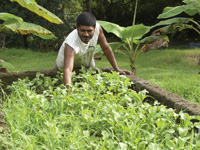 Any gardener in Canada can share at least one story of challenge and triumph when trying to grow their favourite vegetable.
Any gardener in Canada can share at least one story of challenge and triumph when trying to grow their favourite vegetable.
In Africa, Asia, and South America, families who plant essential food items are constantly challenged by the harshest of climates, a lack of water, and the most basic harvesting tools. Yet, they have learned to be innovative and creative with their knowledge and resources.
Lessons Canadian gardeners can learn from those who plant in developing countries are:
• Diversify by planting different varieties. In drought and pest-prone climates people know not to put all their eggs in one basket. You may love tomatoes but if they don’t come in as well as you hoped, then you can enjoy a back up harvest of cucumbers or peppers.
• Share your expertise with a neighbour. Those who plant in the developing world share their know-how and understanding with their community for all to benefit. Talk with your neighbors to get gardening tips. Implementing their gardening secrets will help your garden flourish.
• Get to know your environment. Your soil may not be appropriate for all types of seeds. Take a cup of soil and study the particles you find in it. Is there clay, sand, gravel, and organic material? Find out what would grow best in the type of soil you have in your garden.
• Remember to share the fruits of your labour. If you are blessed with an abundance of vegetables and fruits, don’t create waste – share with friends, neighbours, and local food banks who accept fresh goods. You can also provide nutritious food to families in developing countries by purchasing vegetable garden seeds for $15, fruit trees for $20, or garden tools for $50 at www.ccfcanada.ca/Gifts. Make a difference to children and families living in poverty.
www.newscanada.com
Latest posts by Canadian Home Trends (see all)
- Dining Room Design Tips - July 2, 2025
- Practical Luxury in Forest Grove - July 2, 2025
- The Hidden Value of Great Design - July 2, 2025






